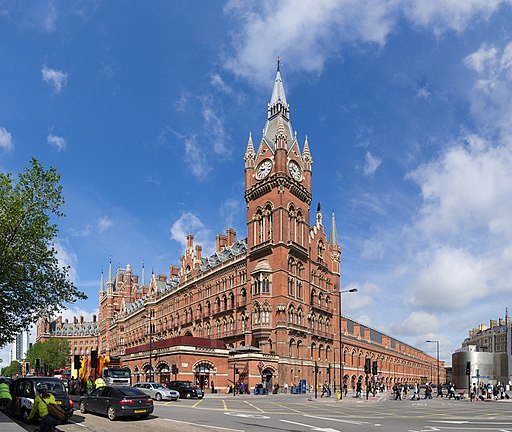I recently came across this story in National Geographic about St. Pancras Station:
The Unlikely Rebirth of a London Legend

The poet whose campaign saved St. Pancras was Sir John Betjeman (1906-1984), who was poet laureate of the United Kingdom from 1972 until his death.
One of Betjeman’s most famous (and controversial) poems is “Slough,” which expresses, let’s say, dismay at the dehumanizing forces of industrialization in and around the town of Slough, in ten neatly rhyming stanzas. Here’s the final stanza, as a taste:
Come, friendly bombs and fall on Slough
To get it ready for the plough.
The cabbages are coming now;
The earth exhales.

Although Betjeman regretted the harshness of the poem (at least according to his daughter, who in 2006 apologized to Slough’s mayor by presenting him with a copy of her father’s poetry that presumably included the offending poem), “Slough” inspired works of art that variously critique and correct the original or endorse and expand its dark view. For instance, in 2005, Ian McMillan attempted to rehabilitate “Slough” with the same rhyme scheme and, to my ear, considerably less craft. Here’s McMillan’s tenth stanza:
So, Children, Husband, partner, wife
Dismiss the poet’s rhyming knife
Slough’s the place to live your life
So hoist Slough’s sails!
McMillan gets credit for “rhyming knife” — very nice. On a happier note, the Punk band Gallows — whose music everyone should sample at least once — expressed their admiration for Betjeman’s poem with titles like “Come Friendly Bombs” and “Swarm Over Death.”
Reading Betjeman’s poetry is a special kind of pleasure, but one of my favorite pop culture references to Betjeman turns up in The Office (the real one). After reading an excerpt from “Slough,” David Brent, in typically willful and insolent naïveté, solemnly intones, “You don’t solve town planning problems by dropping bombs all over the place.”
And that brings us back to St. Pancras and its flourishing neighborhood —thanks to the poet “who saved this glorious station.”
The earth exhales.
